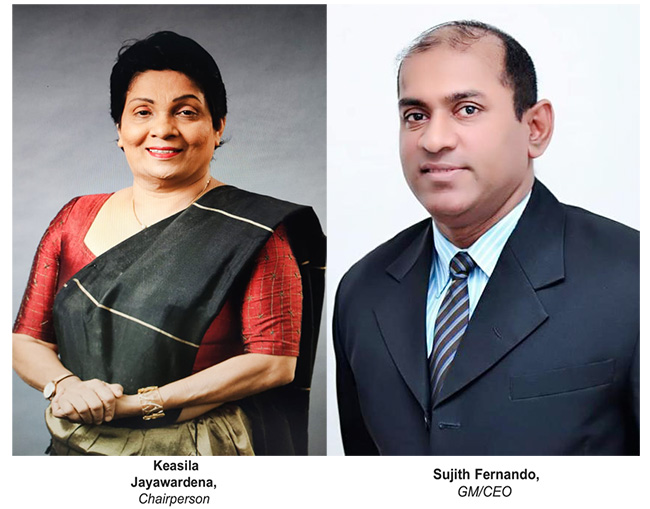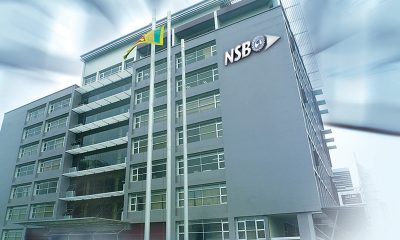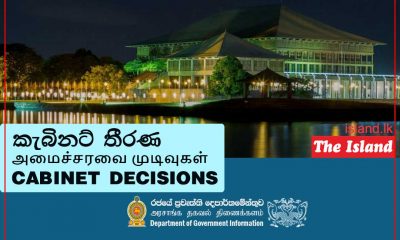Business
Sri Lanka Savings Bank PAT grows 74% to LKR 445 Mn.

Sri Lanka Savings Bank said that it demonstrated agility in a challenging year amidst an unprecedented economic crisis by achieving a growth in Profit After Tax (PAT) of 74% to LKR 445.1 million for the year ended 31st December 2022 compared to LKR 255.1 million recorded a year earlier.
Chairperson, Keasila Jayawardena said ” amidst tremendous social and economic challenges bank has been able to sustain earnings and has shown it’s financial agility and strength. She thanked the Board of Directors for it’s leadership and the staff of Sri Lanka Savings Bank and also the Parent of Sri Lanka Savings Bank, National Savings Bank for the support given to achieve these results.
Commenting on the results the GM/CEO, Sujith Fernando said that “efficient utilization of assets, prudent risk management and effective command over costs have enabled the Bank to achieve robust results amidst severe social and economic challenges, high inflation, overall contraction of the economy and restrictions placed on the Bank due to proposed merger with it’s Parent, National Savings Bank.
Bank’s interest Income increased by 86% to LKR 1,119.7 million as a result of improved yields from investments and loan portfolio. The Bank was able to get the advantage of elevated interest rates and re-priced most of it’s treasury assets which contributed a significant portion to the interest income. The net interest income increased by 99%. The prudent management of interest earning assets and market risks lead to an increase in Net Interest Margin by 7.66% to 14.98%.
The Bank’s Return on Assets after tax improved to 5.19 % in 2022 from 2.84% in the year 2021. The Return on Equity after tax increased to 6.40% from 3.83% a year ago. Amidst severe strain on businesses and SMEs, the Bank took a prudent approach in impairing assets and due to this the impairment increased by LKR 149 million compared to year 2021.
Bank’s operating expenses increased by 25% year on year to LKR 373.1 million amidst higher personnel expenses, depreciation of Rupee and overall price increases due to inflation. Compared to the year 2021, personnel expenses grew by 28% in 2022 mainly due to increase in cost of living allowance. Other expenses increased moderately only by 16% due to stringent cost control measures.
Due to the proposed merger with National Savings Bank, Central Bank of Sri Lanka has placed restrictions on lending and deposit mobilization on Sri Lanka Savings Bank since January 2021. Due to this reason the bank has witnessed a degrowth in it’s portfolio and assets. However, this has enabled the Bank to be highly liquid and to have higher capital adequacy ratios.
The Bank has been the pioneer in lending to micro finance institutions and giving technical assistance to them. However, now most of these micro finance institutions are self sufficient in funding. The Bank also granted moratoriums to all clients who requested them carrying out the social responsibility towards clients. If the proposed merger goes through the SLSB will be absorbed by National Savings Bank.
Business
SLAF, Aviyana Ceylon partner to elevate high-end sports tourism with Eagles’ Monsoon Cup 2026

Aviyana Ceylon, Sri Lanka’s upcoming ultra-luxury seven-star hospitality project, has stepped decisively into the country’s high-end sports tourism space by coming on board as the principal sponsor of the prestigious Eagles’ Monsoon Cup Golf Tournament 2026, in partnership with the Sri Lanka Air Force (SLAF).
The international-standard golf tournament is scheduled to be held on January 11, 2026, and is expected to attract diplomats, corporate leaders, high-net-worth individuals and overseas golfers, reinforcing Sri Lanka’s positioning as an emerging premium leisure and sporting destination.
Under the patronage of Aviyana Ceylon chairman, Dr. Thisara Hewawasam, the company has committed a Rs. 2.5 million sponsorship, marking one of the most significant private-sector investments in elite golf events in recent years.
The sponsorship was formalised at a ceremonial cheque handover held at the Sri Lanka Air Force Headquarters, where Dr. Hewawasam officially handed over the cheque to Commander of the Air Force, Air Marshal Bandu Edirisinghe.
“Our decision to support the Eagles’ Monsoon Cup goes beyond sport. It is a strategic investment in positioning Sri Lanka as a global luxury tourism and lifestyle destination, Dr. Hewawasam said.
“International sporting events with strong networking potential play a critical role in shaping perceptions, attracting premium travelers and enhancing the country’s brand equity. Aviyana Ceylon is committed to supporting platforms that elevate Sri Lanka’s global standing, he added.
Senior SLAF officials, including chairman, Eagles’ Golf Links, Air Commodore Erandika Gunawardhana, secretary of the Air Force Sports Council and Director Media, Group Captain Eranda Geeganage, Secretary of Eagles’ Golf Links, Group Captain Asanka Ratnayake and SLAF Golf Secretary, Wing Commander R.A.S.T.A. Fernando, along with Aviyana Ceylon representatives and invited guests were present at the event.
Air Marshal Bandu Edirisinghe welcomed the partnership, noting that collaboration between the military and private sector is vital in developing sports diplomacy and tourism-led economic activity.
“Eagles’ Monsoon Cup has evolved into a premier sporting event that brings together global and local stakeholders. The support extended by Aviyana Ceylon strengthens our ability to host events of international calibre and contributes meaningfully to sports tourism and national image-building, the Air Force Commander said.
Beyond the golf tournament, the partnership opens the door to new experiential tourism initiatives, including a proposed collaboration to offer luxury helicopter tours for Aviyana Ceylon’s clientele, operated in coordination with the Sri Lanka Air Force.
According to Dr. Hewawasam, the concept aims to provide discerning travelers with exclusive aerial experiences showcasing Sri Lanka’s landscapes, coastlines and heritage.
“Luxury heli-tours represent a new dimension in experiential tourism. They allow us to present Sri Lanka’s natural beauty from a unique vantage point, appealing to high-value travelers seeking privacy, exclusivity and unforgettable experiences, he said.
Industry observers note that such initiatives align with global trends where luxury hospitality brands integrate sports, aviation and curated experiences to differentiate destinations and increase average tourist spend.
The Eagles’ Monsoon Cup is widely regarded as one of Sri Lanka’s most elite sporting events, functioning not only as a golf tournament but also as a high-level networking platform linking diplomacy, business and leisure.
By Ifham Nizam
Business
‘Tea industry largely spared cyclone damage’

Reports received by us from tea brokers, the Colombo Tea Traders’ Association (CTTA) and other sources indicated that, by and large, the local tea sector has been spared by the recent weather havoc.
The CTTA in their recent communications said that although Cyclone Ditwah affected parts of Sri Lanka, production, sales, and exports of tea continued without interruption. Clearly, the report said, the well established and highly coordinated industry network was fully geared to confront these issues. Production and sales continued with least disruption . While some tea growing areas in Uva, and the Central Province experienced some impact no loss in manufacturing capacity was reported.
Damage was largely confined to specific roads, resulting in temporary disruptions to transportation. Some key routes connecting plantations to the city have now been reopened and transport services are resuming normal operations. Harvesting operations are gradually returning to normal with access roads being reopened and temporary roads have been constructed to facilitate transport of green leaf to manufacturing locations.
The tea small holders we met said, although their production routine was affected, quick return to normalcy was ensured thanks to the established Tea Small Holders’ Association whose action ensured speedy return to normalcy. They reiterated production was near normal; and the dismal situation was now in a controlled position. They assured that such losses were minimal and could be recouped with minimum delay.
The CTTA further said the majority of plantations and small holder lands in the South of the island were spared cyclone damage. Harvesting, manufacturing and transportation activities are continuing as usual.
Trading activities at the Colombo Tea Auctions continue to be held although with a revised calendar. The tea auction previously set for the 1st week December has been rescheduled for the last week December. This adjustment ensures uninterrupted financial flows to the producers , including small holders, maintaining the momentum of the industry.
Forbes and Walker Tea Brokers reported a national tea sale average for November of Rs. 1137.22 ( USD3.89) which shows an increase of Rs.61.17 and USD 0.02 YOY. The total National Sale Average for the year 2025 ( to date) was recorded at Rs. 1,164.97( USD 3.88). a decline of Rs . 63.49 ( USD 0.17) against the corresponding year’s average of Rs. 1228.46 (USD4.05). The report further said all elevations recorded negative variances during the period January to November 2025 in comparison to the cumulative corresponding year of 2024 in both LKR and USD terms.
By Steve A. Morrell
Business
Elephant House Ice Cream marks historic launch in Australia

Ceylon Cold Stores PLC (CCS), a subsidiary of John Keells Holdings PLC, has launched its iconic Elephant House Ice Cream in Australia, marking a bold step in the brand’s global expansion. The official unveiling took place on 4th December 2025 at the Novotel Melbourne Glen Waverley, where industry leaders, local distributors, and strategic partners gathered to celebrate the occasion. The launch was further honoured by the presence of Ms. Pradeepa Seram, Consul General Designate of Sri Lanka, and Ms. Cassandra Fernando, Member of the Australian Parliament, reflecting the deep and growing connections between Sri Lanka and Australia.
Elephant House is one of the highest-penetrated Sri Lankan brands among Sri Lankan communities living overseas, with a presence in 16 countries, including the Maldives, Australia, and the United Kingdom, among others.
In a significant milestone for the company, Elephant House Ice Cream is now manufactured locally in Melbourne to support wider availability in the ethnic market in Australia. The range currently available includes Vanilla, Karutha Kolomban, and Fruit and Nut in 500ml packs. This marks the first time in CCS’s 150-year legacy that Elephant House Ice Cream has been produced outside Sri Lanka, signalling a new chapter in the company’s international growth journey in collaboration with Millennium Imports Pty Ltd, it’s one of the franchise partners for Australia.
-

 News6 days ago
News6 days agoBritish MP calls on Foreign Secretary to expand sanction package against ‘Sri Lankan war criminals’
-

 News5 days ago
News5 days agoStreet vendors banned from Kandy City
-

 Sports6 days ago
Sports6 days agoChief selector’s remarks disappointing says Mickey Arthur
-

 Opinion6 days ago
Opinion6 days agoDisasters do not destroy nations; the refusal to change does
-

 News7 days ago
News7 days agoSri Lanka’s coastline faces unfolding catastrophe: Expert
-

 News5 days ago
News5 days agoLankan aircrew fly daring UN Medevac in hostile conditions in Africa
-

 Midweek Review7 days ago
Midweek Review7 days agoYear ends with the NPP govt. on the back foot
-

 Sports7 days ago
Sports7 days agoLife after the armband for Asalanka














